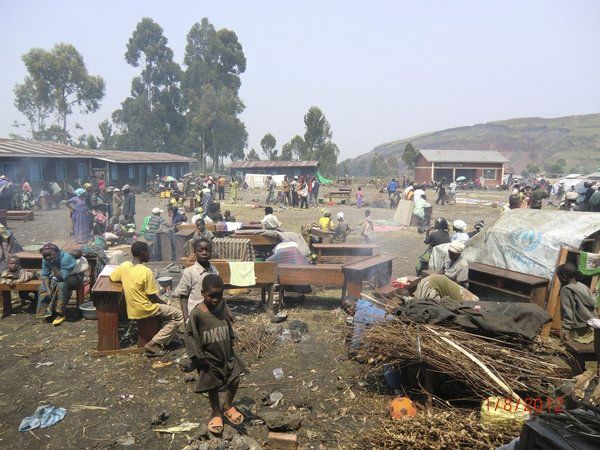MSF expands emergency medical programmes in response
Médecins Sans Frontières (MSF) has expanded its emergency medical programmes in the east of the Democratic Republic of Congo (DRC) in response to increasing humanitarian needs in the region.
“We’re witnessing ongoing mass population movements across the provinces of North and South Kivu, with entire families fleeing multiple conflicts,” said MSF head of mission Andrew MEWS in Goma. “The proliferation of violence in the region is forcing huge numbers of people to leave their homes in search of safety”.
An MSF emergency intervention started in the unofficial Muganga I camp 20km west of the provincial capital Goma, where around 17,500 people have spontaneously settled and are living in inhumane conditions. The current ratio of people to latrines is over 1,000 to 1, well above any acceptable level. MSF is working to improve water and sanitation facilities in the informal camp and provide free healthcare.
Another new project is providing emergency support to tens of thousands of people who have settled in the village of Kanyaruchinya, 10 km north of Goma. The team currently perform around 3,000 consultations a day at the health centre and have set up a cholera treatment centre to address an outbreak of the disease. Measles vaccinations are also currently underway in the area.
In the Masisi district of North Kivu armed groups have increased their attacks on villages, targeting civilians. Tens of thousands of people have been forced to flee to other villages in the district. MSF mobile medical teams are visiting these areas to provide urgent assistance to the people displaced.
In the neighbouring province of South Kivu, emergency programmes in Minova and Kalungu that were set up earlier in the year to provide free medical care to an influx of people newly arrived in the area will be extended for at least the next six months in light of the current situation. The programmes running mobile clinics and supporting health centres have treated nearly 10,000 people so far. A new health centre in Numbi was also added.
People who have managed to reach official camps represent a mere fraction of those actually displaced. Many more are hiding in the forests of the interior, cut off from medical care and difficult to reach. Others are living with Congolese host families, often strangers who share their food and living quarters with those on the run.
Médecins Sans Frontières (MSF) has expanded its emergency medical programmes in the east of the Democratic Republic of Congo (DRC) in response to increasing humanitarian needs in the region.
“We’re witnessing ongoing mass population movements across the provinces of North and South Kivu, with entire families fleeing multiple conflicts,” said MSF head of mission Andrew MEWS in Goma. “The proliferation of violence in the region is forcing huge numbers of people to leave their homes in search of safety”.
An MSF emergency intervention started in the unofficial Muganga I camp 20km west of the provincial capital Goma, where around 17,500 people have spontaneously settled and are living in inhumane conditions. The current ratio of people to latrines is over 1,000 to 1, well above any acceptable level. MSF is working to improve water and sanitation facilities in the informal camp and provide free healthcare.
Another new project is providing emergency support to tens of thousands of people who have settled in the village of Kanyaruchinya, 10 km north of Goma. The team currently perform around 3,000 consultations a day at the health centre and have set up a cholera treatment centre to address an outbreak of the disease. Measles vaccinations are also currently underway in the area.
In the Masisi district of North Kivu armed groups have increased their attacks on villages, targeting civilians. Tens of thousands of people have been forced to flee to other villages in the district. MSF mobile medical teams are visiting these areas to provide urgent assistance to the people displaced.
In the neighbouring province of South Kivu, emergency programmes in Minova and Kalungu that were set up earlier in the year to provide free medical care to an influx of people newly arrived in the area will be extended for at least the next six months in light of the current situation. The programmes running mobile clinics and supporting health centres have treated nearly 10,000 people so far. A new health centre in Numbi was also added.
People who have managed to reach official camps represent a mere fraction of those actually displaced. Many more are hiding in the forests of the interior, cut off from medical care and difficult to reach. Others are living with Congolese host families, often strangers who share their food and living quarters with those on the run.


